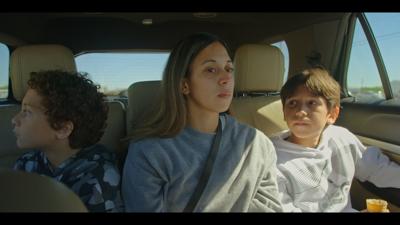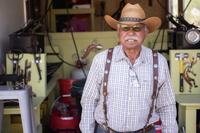
Sitting in the fourth row of the Hollywood Chinese Theatre was Angeli Rose Gomez, a farm worker and single mom who in 2022 ran into Robb Elementary in Uvalde, TX to save her two sons during a mass shooting, while nearly 400 armed officers waited 77 minutes to intervene.
Cut to early June 2025 when "Uvalde Mom," a documentary directed by Anayansi Prado, was now making its West Coast premiere at the Los Angeles Latino International Film Festival to a large crowd of Latino filmmakers and movie goers. The film, which premiered at South By Southwest in March, is not only a terrifying story of a mass casualty school shooting, but also the story of one mother who dared to go against law enforcement and to this day faces ongoing backlash.
In what was an enduring question, as one sits in the theatre, you truly wonder, how does one make sense of the tragedy in Uvalde? For the United States, it was just another mass shooting. For the city of Uvalde, it is a tragedy that continues to mark, divide and harm the city and its residents.
At the top, the film reminds us of what happened in 2022, the heartbreak of what was lost: 19 students and two teachers.
Yet, we get to see very closely through the eyes of Angelise Rose Gomez what exactly happened on that day and hear from her loved ones and friends how, despite becoming a hero online, over the suceeding years, she has now become a target by local law enforcement.
Harassment and healing
The film also starts with Angelise in the year 2024, living with her grandmother because the local police in Uvalde have gone out of their way to allegedly harass and intimidate her.
After the shooting, the footage of her carrying her sons outside of Robb Elementary during the shooting went viral. It was direct evidence to some that law enforcement didn’t do enough, and that some parents had to take matters into their own hands.
Her name, face, and comments were then picked up by hundreds of news outlets from all over the world, mostly because Angelise was also a vocal, sharp and adversarial voice in all of her interviews.
The documentary reminds you of her stances at the time, but jumps back to the present continuously to showcase how these remarks, her First Amendment right, were condemned by the local law enforcement through random visits, an escalation of her probation surveillance and with unmarked cars following her and her kids.
We hear from her family, including her grandmother, who opens her home to Angelise and her children as they attempt to rebuild their lives. Her children, still young, are seen playing in the yard, while Angelise shares how difficult it is to find work or even go grocery shopping without being followed or harassed. The audience can’t help but feel the weight of the ongoing surveillance and intimidation that trails survivors like Angelise who speak out.
This portion of the documentary is perhaps its most urgent, reminding viewers that trauma is not a closed chapter once the cameras leave. For Angelise, the trauma lingers not just emotionally, but structurally and socially. Even years after the shooting, her attempt to advocate for her children’s safety has placed her at odds with an entire system.
A women of color documentary that bridges the personal and the political
Anayansi Prado is able to do what is at most difficult in documentary film and that is tell the hardest and darkest stories all while maintaining the dignity of those she follows.
For decades, documentaries have been about the outsider parachuting into outside communities. Women of color documentarians are also harder to find within the industry.
What Prado achieves in “Uvalde Mom” is both personal and political. She carefully avoids voyeurism and instead allows the story to unfold from the inside in ways that are still missing from the dozens of documentaries that have popped up about the shooting. The film doesn't seek to sensationalize the horror of the shooting but to understand the continued cost of survival. Prado creates a space where Angelise can narrate her own reality, in her own voice, from her own lived context. That is rare.
In interviews after the screening, the producers mentioned that the project began with a simple question: What happens after the headlines fade? The result is a layered portrait not just of a mother, but of the systems that uphold silence, retaliation and the erasure of working-class Latina women.
This past April, the city finally reached a settlement with the families of the victims, with ongoing findings still being revealed on what happened on that day and how law enforcement did and didn’t respond.
The settlement may bring some financial restitution, but for many—including Angelise—it has not brought peace or protection. In fact, much of the community still finds itself very divided.
The film shows how some residents of Uvalde feel Angelise brought “negative attention” to the town, a reminder of how collective trauma can fracture communities rather than unite them. Her criminal record has become gossip fodder and has even isolated Angelise from her neighbors.
“Uvalde Mom” also touches on broader themes that go beyond the singular tragedy. It explores how poverty, policing, immigration status and motherhood intersect in the life of one woman—and by extension, in the lives of so many others across the country.
Angelise, as a farmworker, not only faced danger during the shooting, but also worked multiple jobs to provide for her family before and after the event. Her activism came at the cost of her livelihood and the safety and privacy of her whole family. She was briefly put under surveillance, allegedly threatened with trespassing charges and even arrested weeks after the shooting in an incident many have called retaliatory.
The film weaves these moments together with an understated grace, never losing sight of the human at the center of the narrative. And for the audience, especially a room filled with Latino filmmakers and community leaders, it serves as a sobering call to action. Who gets protected? Who gets criminalized? Who gets forgotten?
Through all of this, Angelise remains resolute, kind and humble. She is not portrayed as superhuman. Instead, we witness her as a mother, a daughter and a woman navigating impossible conditions. That complexity—real and often contradictory—is one of the film’s greatest strengths.
As mass shootings continue to plague the country and as the public becomes desensitized to tragedy, “Uvalde Mom” insists that we remember the individuals behind the headlines, that we also question authority and who gets to wield it: is it government officials or the families?
It asks viewers not only to witness trauma but to interrogate the structures that perpetuate it and what it means for a city to really heal.
In the final scenes of the film, Angelise visits the memorials of the children who were lost that day. Her sons cry with her. She places flowers, hugs other parents and cries quietly. There is no speech.
No declaration.
Just the silence of grief—and a camera that doesn’t look away.
"Uvalde Mom" is not just a film about Uvalde. It is a film about power, motherhood, dignity, and survival.











(0) comments
Welcome to the discussion.
Log In
Keep it Clean. Please avoid obscene, vulgar, lewd, racist or sexually-oriented language.
PLEASE TURN OFF YOUR CAPS LOCK.
Don't Threaten. Threats of harming another person will not be tolerated.
Be Truthful. Don't knowingly lie about anyone or anything.
Be Nice. No racism, sexism or any sort of -ism that is degrading to another person.
Be Proactive. Use the 'Report' link on each comment to let us know of abusive posts.
Share with Us. We'd love to hear eyewitness accounts, the history behind an article.